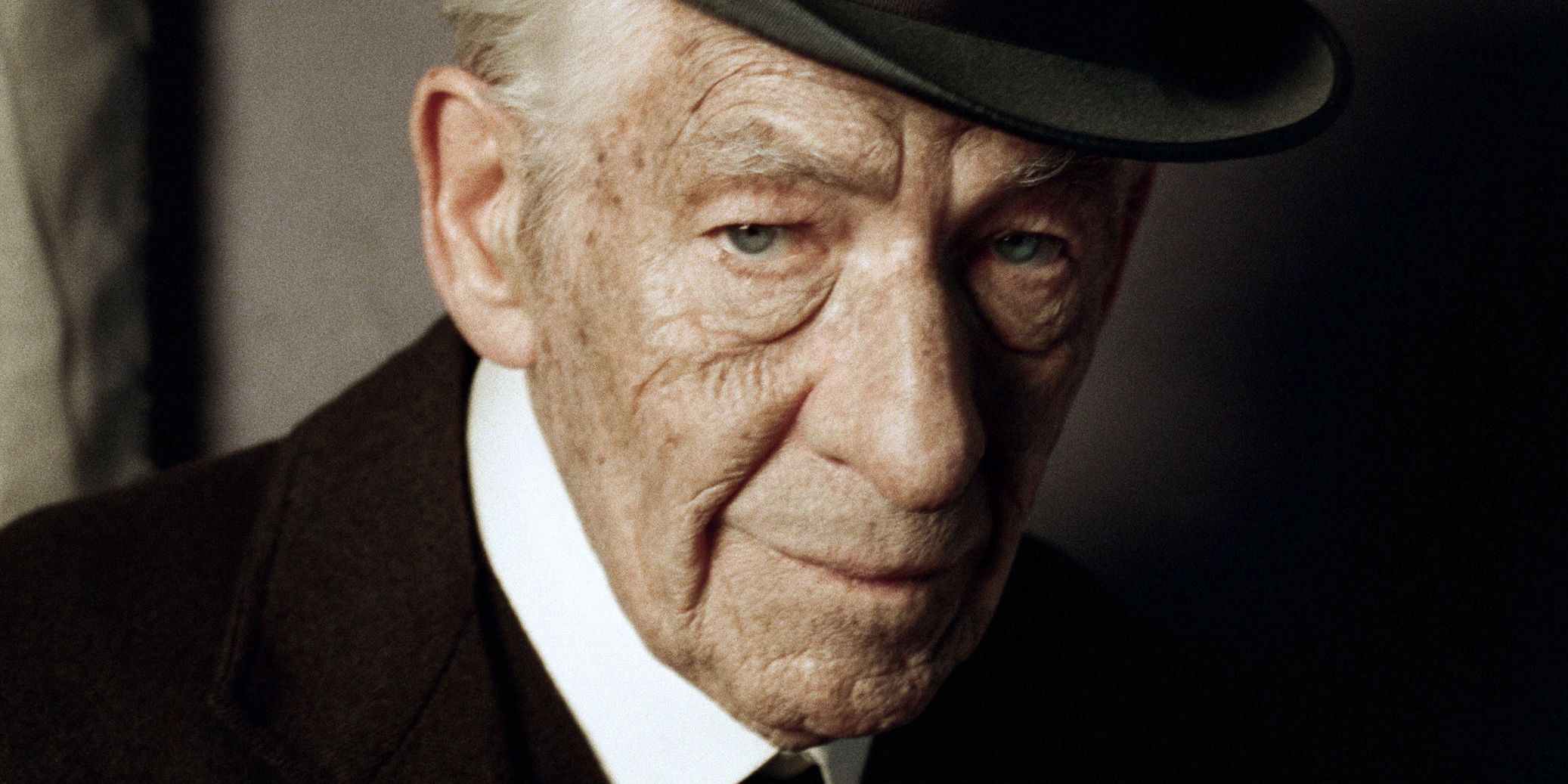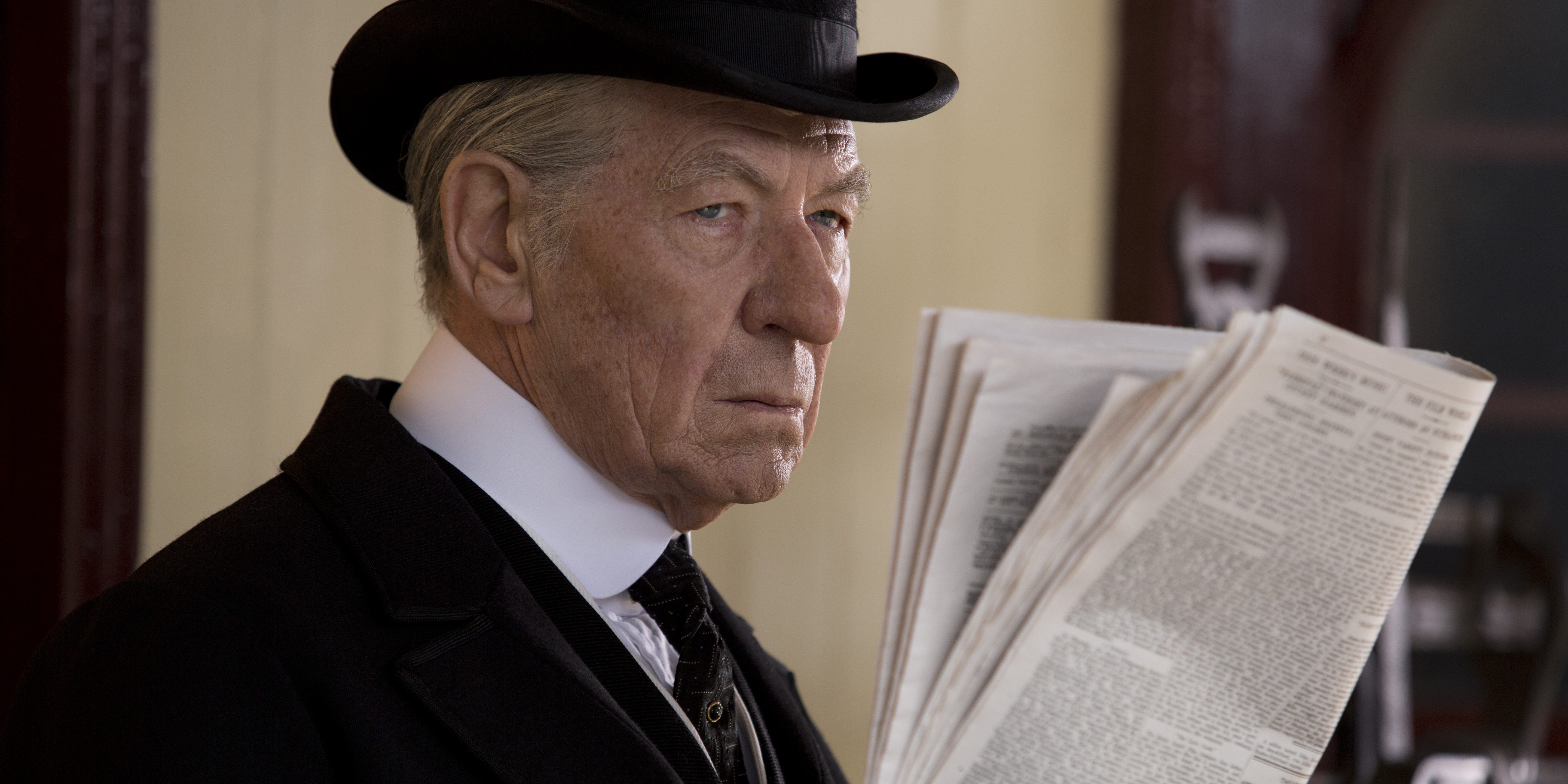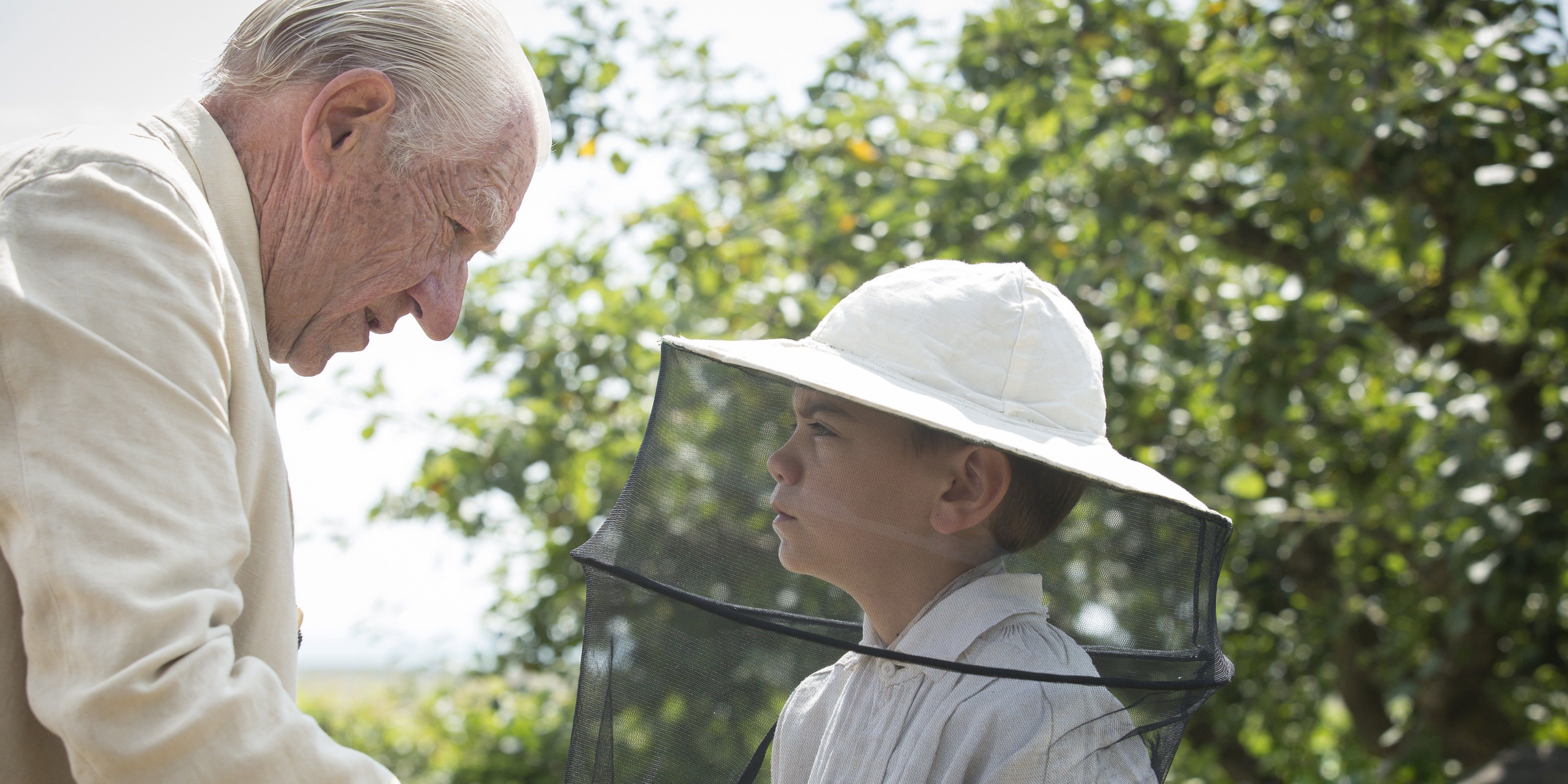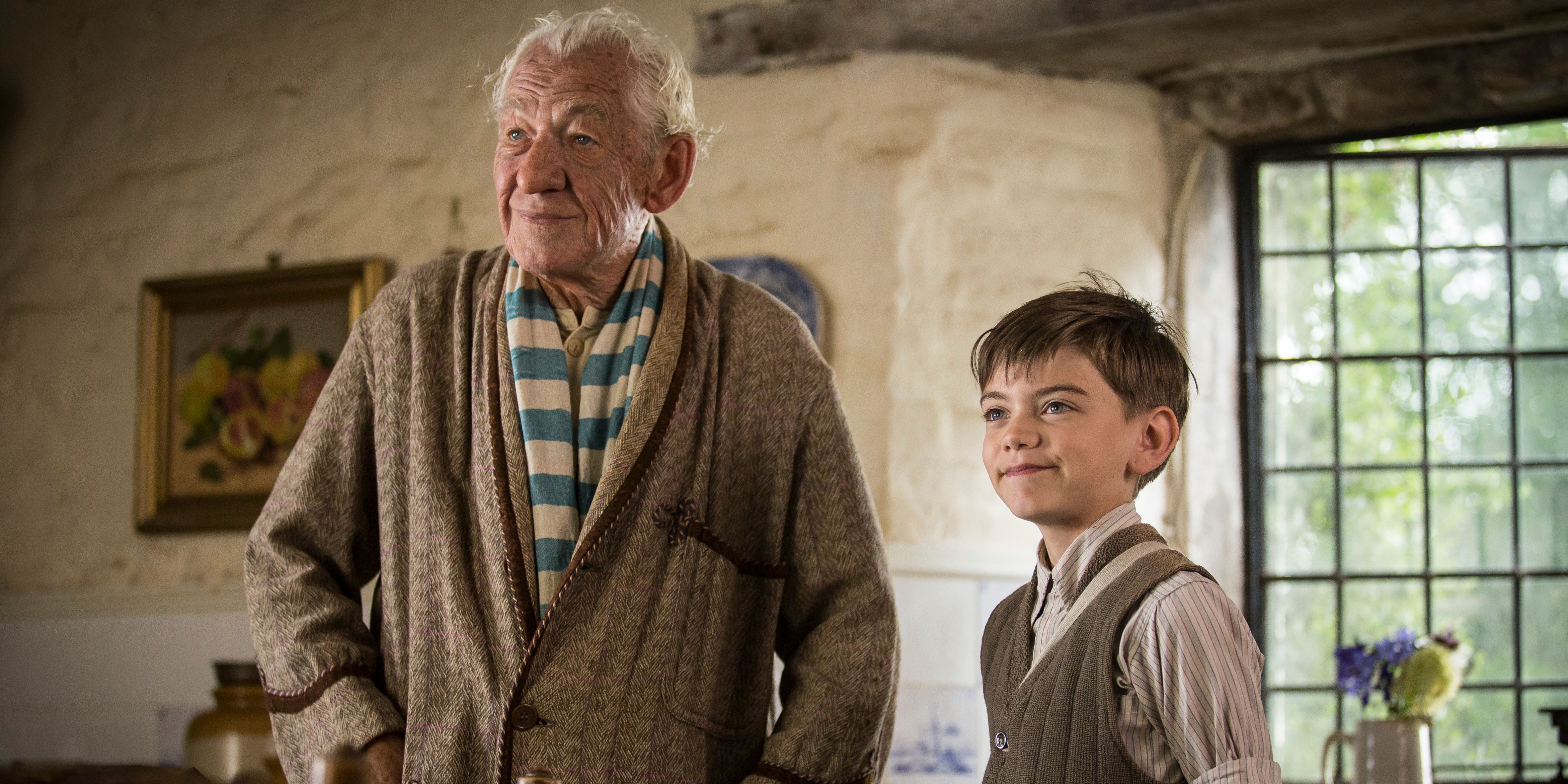In June of 2020, it was announced that Michael Keaton would reappear in the DC film universe as Bruce Wayne, prompting a litany of Twitter chatter, rumors, and desires for a feature length live-action Batman Beyond movie. I see the appeal; Batman Beyond, which aired from 1999-2001, is an uncommonly mature cartoon, a sci-fi/cyberpunk-tinged take on the Batman mythos, and a beautiful examination of what it means for an individual (Bruce Wayne, played in an older state by Kevin Conroy) to pass on his lessons and legacy beyond himself (Terry McGinnis, our new Batman, played by Will Friedle). Of course I’d love to see this rich series explored in a big-budget contemporary film space, and of course doing it with Keaton and Robert Pattinson would be dope as heck!
But here’s the thing. We kinda already have a Batman Beyond film; it’s just not called Batman Beyond by name. It’s called — and please stick with me — Mr. Holmes.
Released in 2015, the Bill Condon film stars Ian McKellen as an aging, and possibly even dying version of Sherlock Holmes, the world’s greatest detective before Batman snatched that mantle away from him. In fact, the co-creator of Batman, Bob Kane, has name-checked Arthur Conan Doyle’s famed detective as being a direct influence on his caped crusader, and it’s not hard to see that influence in any incarnation of the crime-solving superhero (heck, DC stands for Detective Comics!). Like Wayne in Batman Beyond, this Holmes’ acts of heroism are behind him, and he has retired to his own version of a Batcave — an idyllic English farmhouse where he tends to bees and bickers with his own version of Alfred, his housekeeper Mrs. Munro, played by Laura Linney. Like Wayne in Batman Beyond, Holmes waffles between resentment of the deification of his symbolic legacy beyond him (in the text of this film, Holmes’ assistant Dr. John Watson is the author of the Sherlock Holmes mystery novels responsible for much of the iconic pop cultural elements of Holmes), a desire to hide away from an Earth he feels he’s made worse in some mysterious way, and a prickling need to tell the final version of his story through something more accurate to his actual goals. At the beginning of the film, Holmes’ only legacy are the regrets he’s full of, the cases he’s screwed up, the idiot amateur sleuths in his wake (think the hockey pad-wearing wannabe in The Dark Knight). In one brilliantly meta sequence, Holmes even goes to see a film version of one of his cases, despising it in its melodramatic falsities through and through. Holmes needs to right these wrongs, to write the truth with emphatic punctuation, even if that punctuation is an ellipses. He needs to “get it right before I die,” as he puts it bluntly.
And, like Wayne in Batman Beyond, Holmes finds a vessel of legacy in the most unlikely and headstrong of places — even if he’s reluctant for some of the journey. Mrs. Munro has a young son named Roger, played by Milo Parker. Roger has suffered the recent death of his father, and acts quiet and removed around his trying mother. That is, until he meets Mr. Holmes. Roger is naturally attentive and curious, enjoying the procedures of Holmes’ deductions and methodologies. Holmes — and Roger’s mother Mrs. Munro — are unsure at first of this partnership, with Holmes recollecting that he “chose exile for my punishment” and Mrs. Munro reminding her son that “Mr. Holmes won’t last forever.” But Roger’s revitalized sense of passion and dedication, not just to Holmes’ stories of cases gone by but of the less dramatic task of taking care of Holmes’ bees, energizes both he and Holmes. We watch Holmes step out of his self-imposed stupor, teaching Roger the tactics of observation, inviting him along the ocean’s coast, and simply smiling that there’s someone like him to keep moving in the future. At one point Roger asks Holmes if he needs a physical piece of evidence to remember a case from his past. Holmes responds, simply, “The only inspiration for any sort of recollection is you.”
But the film doesn’t present a clean and simple passing of the torch without any complications. To keep framing it in superhero movie terms, Mr. Holmes is both an origin story of our young Roger becoming a hero, and a “one last job” story of our old Holmes settling into the idea of being a symbol; it’s the Tony Stark/Peter Parker arc from Captain America: Civil War through Avengers: Endgame in one film. And in these status shifts and teaching moments comes, invariably, pain. In Batman Beyond, Terry’s Batman has a quicker temper, an itchier reaction to action, a youthful desire to jump into danger ASAP. This leaves Wayne, so battle-hardened and emotionally beat up from his many years hiding in the darkness of Gotham’s most nefarious shadows, to reign his protégé in, to remind him of the values of patience, to reveal the very human costs of trauma and hurt that come with such a life of “heroism”.
In Mr. Holmes, Holmes, Roger, and Mrs. Munro both see what happens when the limits of nascent ability are ignored in favor of blind passion. It appears as though Holmes’ bees, so lovingly cared for by Roger, have viciously stung the young boy, putting him in a catatonic state of allergic reaction. He sent quickly to the hospital, where neither Holmes nor Mrs. Munro are sure he will make it — a refreshingly personalized take on the idea of a hero’s origin story coming from familial trauma (this time, the trauma is to himself!). In this aftermath, Mrs. Munro gives her version of Alfred’s embattered “I’m leaving you” speech in The Dark Knight Rises, screaming that it should’ve been Holmes who the bees stung, accusing him of using her son as leverage for his own legacy. Here, Holmes reveals the depth of his genuine love for the boy, insisting “I care about Roger. I care about him very much,” before falling to the floor in a heap of tears. Not only has Roger opened up the idea of Holmes ending his story on his terms, but he’s re-opened his heart, too.
The case of Roger’s stings is solved in a canny way set up and paid off beautifully by the film that I would never dream of spoiling here. Suffice it to say, it all cleanly paves the way for young Roger to become our new Sherlock Holmes, our new disseminator of logic, problem-solving, and yes, heart. As for our old Sherlock Holmes? Like he says earlier in the film, “I can’t solve everything.” It’s clear he’s leaving his farmhouse for the Munros to live in on their own; the Batcave given to Terry by Wayne. And while Mr. Holmes may not have the life-or-death action-packed stakes of an average Batman Beyond episode, it has the character dynamics, the examinations of generational heroism, the unorthodox mentorship, and the love that comes from hard work and reckoning with pain. “One shouldn’t leave this life without a sense of completion,” says Holmes, our very own old Bruce Wayne. But in Roger, his Terry, the complete legacy of what Mr. Holmes means moves far beyond Holmes’ life itself.




